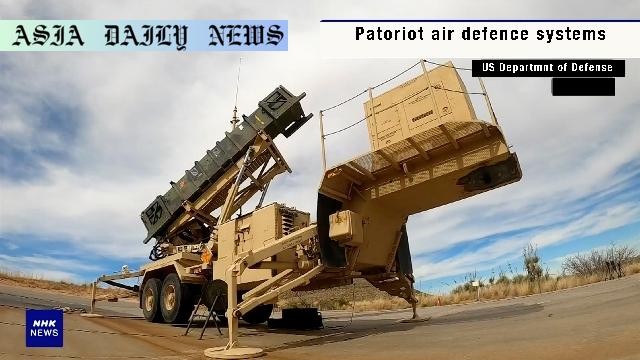Patriot Systems: US President Donald Trump confirms plans to provide Ukraine with Patriot air defense systems amid continued Russian attacks.
- Trump announced the delivery of Patriot air defense systems to Ukraine.
- The European Union is responsible for covering all associated costs.
- President Trump expressed disappointment in Russian aggression and President Vladimir Putin’s tactics.
- This policy marks a shift in Trump’s earlier reluctance to approve further weapons for Ukraine.

US Decision to Deliver Patriot Systems to Ukraine
In a significant policy shift, US President Donald Trump announced plans to provide Ukraine with additional Patriot air defense systems amid the intensifying conflict with Russia. This decision was revealed during a briefing at a military airbase outside Washington, signaling a bold stance against Russian military aggression. The move underscores America’s continued support for Ukraine during a period of heightened geopolitical tensions.
Speaking at the briefing, Trump emphasized the critical need for these advanced air defense systems in Ukraine’s fight to protect its sovereignty. “We will send them Patriots, which they desperately need,” he remarked, stressing his administration’s commitment to bolstering Ukraine’s defense capabilities. Although the exact number of installations remains under discussion, Trump added that financial commitments from the European Union would cover the cost of these systems. This announcement sends a strong message of solidarity to Ukraine and the global community regarding US foreign policy objectives.
Russia’s Ongoing Hostilities and Global Concern
The escalation of Russia’s offensives, including nighttime drone attacks and missile strikes, continues to devastate Ukrainian cities and critical infrastructure. Russia has shown no willingness to agree to a ceasefire, leaving casualties and destruction in its wake. This persistent aggression raises alarm not only for the immediate region but also for international security. The delivery of the Patriot system, known for its advanced defensive capabilities against missiles and other aerial threats, stands as a strategic move aimed at reinforcing Ukraine’s defensive posture in such dire circumstances.
Trump’s frustrations with Russian President Vladimir Putin were made evident during the briefing. “I thought he was somebody that meant what he said,” Trump explained, expressing his disappointment over Putin’s calculated use of diplomacy juxtaposed with relentless aggression. The remark illustrated the erosion of collegial relations between global powers and the challenge of managing Russia’s unpredictability. Trump’s candid comments may also further heighten international scrutiny over President Putin’s actions on the global stage.
Analysis of President Trump’s Shifting Stance
The decision to send additional military aid to Ukraine marks a U-turn for President Trump, who had previously refrained from approving new weapon shipments throughout much of his second term. This change of heart suggests evolving considerations in his administration’s defense and foreign policy strategies. Trump appears increasingly aligned with heightened calls for intervention against Russian aggression amid rising casualties, global condemnation, and security concerns.
By mobilizing key military resources such as the Patriot systems, Trump’s administration is demonstrating a commitment to shielding Ukraine from aerial bombardments while maintaining pressure on Russia. However, Trump’s decision to rely on the European Union for financial support indicates an approach that balances US involvement while prompting international allies to shoulder greater responsibility.
Impacts on Global Security and Future Relations
The decision to reinforce Ukraine’s air defenses comes as a stark warning to countries employing territorial aggression. Russia, in particular, will likely view the move as provocative, potentially escalating tensions even further. Amid these circumstances, international diplomacy faces considerable strain as nations weigh the balance between peaceful negotiations and military deterrence. The situation also showcases the global reliance on US leadership and support in maintaining international order. By providing critical resources and expressing clear disapproval of Russia’s aggression, Trump reaffirms America’s influence on the global stage.
While military strategies are evident, questions about the reconstruction of war-ravaged regions, humanitarian support, and long-term regional stability persist. The continued focus on these key measures is essential in addressing the root causes of conflict and building pathways to enduring peace.



Commentary
Reevaluating Trump’s Decision to Send Patriot Systems
The announcement marks a defining moment in President Trump’s second term, reflecting a shift in his administration’s strategy toward Ukraine. At its essence, the decision to deliver Patriot air defense systems underscores America’s unwavering commitment to countering Russian aggression, while signaling broader geopolitical objectives in Europe.
For many nations observing from afar, this move represents a critical moment in US foreign policy. Weapons like the Patriot systems not only serve as a protective measure but also as a symbolic commitment to Ukraine’s sovereignty. Such advanced military technologies provide a lifeline to nations under siege, underscoring the United States’ role as a key player in preserving global stability.
Balancing Costs and Responsibilities
The fact that the European Union will be responsible for financing the Patriot systems sheds light on a growing trend within Western alliances—the demand for shared responsibilities. Trump’s decision cleverly allocates the burden across allied regions, ensuring collective accountability. This collaboration reflects how the West views Russia’s aggression increasingly as a shared concern rather than an isolated issue confined to Eastern Europe.
Still, there are valid criticisms about whether such decisions risk escalating conflict instead of quelling it. Russia, under the unpredictable leadership of President Vladimir Putin, has shown disdain for defensive assistance to Ukraine. Could this provoke further measures from Moscow? This remains an important question moving forward.
The Global Ripple Effects of Military Aid
At the heart of this complex situation lies a broader narrative about holding nations accountable for their actions. Russia’s continued attacks challenge international expectations of peace and respect for sovereignty. By acting decisively, the US sends a broader message to global authoritarian regimes about the costs of aggression. Simultaneously, this enhances the strategic defense cooperation among democratic nations. As these dynamics evolve, the allocation of powerful defensive technologies like the Patriot system may become an inevitable tool for safeguarding regional stability and freedom.